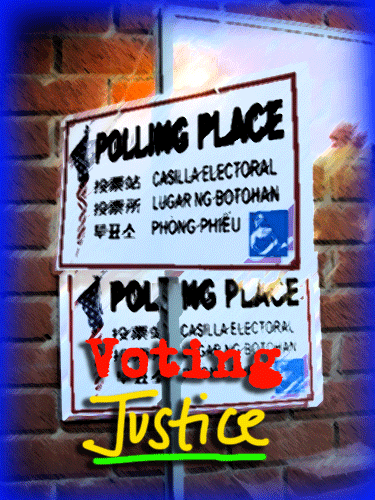NATIONWIDE CRIMINAL JUSTICE BALLOT OUTCOMES AND EFFECTS
In an interactive map post called “Cuff the Vote,” the Crime Report tracked ballot measures and referendums that affect the future of criminal justice policy in America. Here’s a clip:
Among the hot-button issues voters decided are: the legalization of marijuana in Washington, Oregon and Colorado; decriminalization of assisted suicide in certain circumstances in Massachusetts; the abolition of the death penalty in California; and new abortion regulations in Montana.
The Crime Report’s Graham Kates has an analysis of what the outcomes of these criminal justice measures mean. Here’s how it opens:
While this week’s presidential election, as measured by the popular vote, showed the nation was as divided along partisan lines as ever, voters in many states proved themselves willing to take a more pragmatic approach to once-divisive criminal justice issues.
The majorities in favor of permitting medical use of marijuana—and in two states support for outright legalization—were examples.
Another was the passage of California’s Proposition 36, which revised the long-controversial “Three Strikes” policy—one of the thorniest legacies from the “tough on crime” era—which mandates life sentences for a third conviction, even if it was for a non-violent offense.
After several unsuccessful attempts over the years to modify the policy, more than 70 percent of Californians agreed that it was time to change.
The Washington Post’s Sari Horwitz has a story on how the federal government will respond to Colorado and Washington’s legalization of recreational marijuana. Here’s a clip:
In the run-up to the vote on the measures Tuesday, the Justice Department was unusually muted about the possible conflicts between federal and state laws should the initiatives pass, even as former DEA officials called on Attorney General Eric H. Holder Jr. to publicly oppose them.
Colorado Gov. John Hickenlooper (D) on Wednesday signaled his awareness of those conflicts, cautioning voters that it would take time to deal with the implications of the initiative.
“The voters have spoken and we have to respect their will,” Hickenlooper said in a statement. “This will be a complicated process, but we intend to follow through. That said, federal law still says marijuana is an illegal drug, so don’t break out the Cheetos or gold fish too quickly.”
PROP 35 HIT WITH LAWSUIT RIGHT OUT OF THE GATE
As expected, Prop 35, the problematic sex offender bill, is already having portions of the just-enacted statute challenged in court.
SF Weekly’s Coburn Palmer has the story. Here’s a clip:
Today a judge granted a temporary stay to block part of Proposition 35, the measure passed on Tuesday that says those convicted of sex trafficking should be restricted on the Internet. The measure also increases prison sentences and fines for people convicted of sex trafficking. The judge is allowing the stay while the ACLU and the San Francisco-based Electronic Frontier Foundation challenge the proposition, which passed with 81 percent of the vote.
Read the complaint here.
Prop. 35, says sex offenders must register their online screen names, e-mail addresses, and Internet service providers with law enforcement. It also would require them to let police know anytime they leave a comment online, whether it be a restaurant review or an opinion on a blog — and that’s just not right, the groups claim.
“Fortunately our constitution applies to everyone,” says Michael Risher, an attorney for the ACLU. “It’s dangerous to our democracy to say it’s okay, it only applies to those despicables over there.”
NEWLY APPROVED LA PUBLIC LIBRARY ID CARDS
The LA City Council put their final seal of approval on LA Public Library ID cards for undocumented immigrants and others to have access to banking and other services. (WitnessLA’s previous post on the ID cards can be found here.)
KPCC has the story (with help from the AP). Here’s a clip:
The ID card would include a resident’s photograph, full name, address, date of birth and details on height, weight, and hair and eye color. The card would not be a driver’s license and could not be used as an ID to board a plane. It will also be a pre-paid debit card that allows residents to build credit.
Whether law enforcement agencies will accept the ID remains unknown. Distribution is expected to begin early next year.
The council voted 12 to 1 on Wednesday to select a vendor to develop and administer the identity card program.
The new ID is intended to help about 200,000 Los Angeles households that do not have access to banking services. Those families are vulnerable to theft and financial emergencies, according to the Mayor’s Office. A financial institution will back the proposed ID card, and the funds will be FDIC insured.
KCRW’s Warren Olney also discusses the new ID cards in Thursday’s episode of Which Way, LA?

